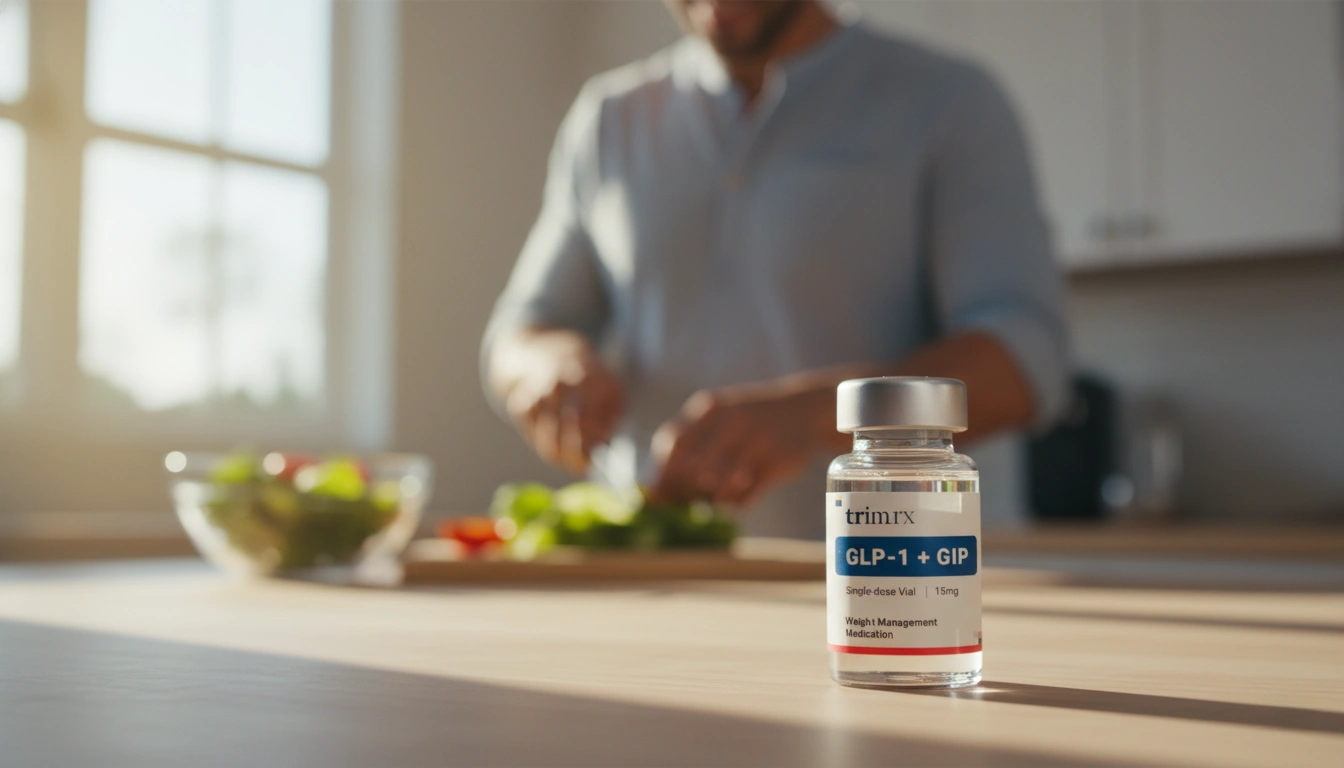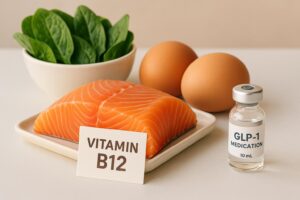How Much Protein on GLP-1 Medications: Optimizing Your Nutrition for Weight Loss

Introduction
Have you ever considered how much protein your body truly needs while navigating the complexities of weight loss? This question becomes even more pertinent when utilizing GLP-1 medications, such as Ozempic or Mounjaro, which are designed to assist with weight management and blood sugar control. These medications, while effective, can alter your appetite and digestion, making it crucial to understand your nutritional needs, particularly protein intake.
Protein plays an essential role in our health and wellness, especially in the context of weight loss. Not only does it help preserve lean muscle mass, but it also contributes to feelings of fullness, which can be particularly beneficial when appetite is suppressed by GLP-1 medications. In this blog post, we’ll explore the significance of protein, how much you should aim to consume while on GLP-1 medications, and practical tips for integrating protein into your diet.
At TrimRx, we believe that sustainable weight loss should be achieved through science, empathy, and a transparent approach. Our personalized, medically supervised weight loss programs are designed to support individuals on their journey towards healthier lifestyles. By the end of this post, you’ll have a clearer understanding of how to optimize your protein intake while using GLP-1 medications to enhance your weight loss efforts.
Let’s embark on this journey together, ensuring that we address your unique nutritional needs and help you achieve your weight loss goals effectively.
The Role of Protein in Weight Loss
Why Is Protein Important?
Protein is a vital macronutrient that supports numerous bodily functions. It is essential for:
- Muscle Preservation: When losing weight, it’s common to lose muscle mass alongside fat. Adequate protein intake helps minimize this loss and maintain metabolic health.
- Satiety: Protein-rich foods promote feelings of fullness, which can combat the appetite-suppressing effects of GLP-1 medications, ensuring you meet your daily caloric and nutritional needs.
- Blood Sugar Control: Protein can moderate the rise in blood sugar levels after meals, contributing to stable energy and reduced cravings.
How GLP-1 Medications Affect Protein Needs
GLP-1 medications mimic the glucagon-like peptide-1 hormone in our bodies, which helps regulate appetite and digestion. While they can assist in weight loss, they may also lead to gastrointestinal side effects that make it challenging to consume adequate nutrition. This is where understanding protein requirements becomes crucial.
Research indicates that individuals taking GLP-1 medications may need to be more intentional about their protein intake. Without sufficient protein, you risk muscle loss, which can slow metabolism and make weight management more challenging.
Recommended Protein Intake on GLP-1 Medications
General Guidelines
The Recommended Dietary Allowance (RDA) for protein is generally set at 0.8 grams per kilogram of body weight. However, many experts recommend higher protein targets for individuals on GLP-1 medications, especially those aiming to lose weight or build muscle.
Protein Intake Recommendations:
- Minimum: At least 60 grams of protein per day.
- Target: Between 1.0 to 1.5 grams of protein per kilogram of body weight. For example, if you weigh 200 pounds (approximately 90.7 kilograms), your protein goal would range from 81 to 135 grams per day.
Factors Influencing Protein Needs
Several factors can influence your specific protein needs, including:
- Weight Loss Goals: Those with higher weight loss targets may need increased protein to preserve muscle.
- Activity Level: If you engage in regular physical activity or resistance training, your protein needs may be elevated.
- Individual Metabolism: Everyone’s body is different; some may require more protein to maintain their energy levels and muscle mass.
For personalized recommendations, we encourage you to take our free assessment quiz at TrimRx. This will help you determine the right protein intake tailored to your unique needs and weight loss journey.
Best Sources of Protein for GLP-1 Users
High-Protein Foods to Consider
Incorporating a variety of protein-rich foods into your diet will not only help you meet your protein goals but also ensure you receive a comprehensive range of nutrients:
- Lean Meats: Chicken breast, turkey, and lean cuts of beef are excellent sources of protein.
- Fish and Seafood: Options like salmon, tuna, and shrimp provide high-quality protein and healthy fats.
- Dairy Products: Low-fat yogurt, cottage cheese, and cheese can be great protein sources.
- Plant-Based Options: For those preferring vegetarian or vegan diets, foods like lentils, beans, chickpeas, tofu, and tempeh offer substantial protein.
Protein Supplements
If you find it challenging to meet your protein needs through food alone, protein supplements can be an effective solution. At TrimRx, we recognize the importance of incorporating protein in a way that aligns with your dietary preferences and lifestyle.
- Protein Powders: These can be easily mixed into smoothies or shakes to help boost your daily protein intake.
- Protein Bars: Convenient for on-the-go snacking, but be mindful of ingredients to avoid added sugars and unhealthy additives.
Tips for Incorporating Protein into Your Diet
- Distribute Protein Intake: Aim to include a source of protein at every meal to promote muscle preservation and reduce feelings of hunger.
- Choose Nutrient-Dense Options: Opt for foods that provide a good balance of protein, vitamins, and minerals, such as Greek yogurt with berries or a spinach salad topped with grilled chicken.
- Plan Ahead: Preparing meals in advance can help ensure that you have protein-rich options readily available, making it easier to stick to your goals.
Monitoring Your Progress and Adjusting Intake
Listening to Your Body
As you navigate your weight loss journey with GLP-1 medications, it’s essential to tune into your body’s signals. Monitor how you feel regarding energy levels, appetite, and overall well-being. If you notice increased fatigue or signs of muscle loss, it may be time to re-evaluate your protein intake.
Regular Follow-Ups
Engaging with healthcare providers or registered dietitians can provide additional support and guidance. Regular check-ins ensure that your nutrition aligns with your weight loss goals and allows for adjustments as needed.
At TrimRx, our commitment to personalized care means we are here to support you every step of the way. Our medically supervised programs come with consultations that can help you stay on track and reach your goals effectively.
Conclusion
Understanding how much protein to consume while on GLP-1 medications is vital for maintaining muscle mass, controlling appetite, and achieving sustainable weight loss. By ensuring you meet your daily protein needs, you can enhance your weight management efforts and overall well-being.
At TrimRx, we believe that every individual’s journey is unique, and we are dedicated to providing personalized support tailored to your specific requirements. By taking our free assessment quiz, you can gain insights into your protein needs and explore our comprehensive weight loss solutions.
Together, let’s embrace this journey towards a healthier lifestyle, focusing on balanced nutrition and effective weight management strategies.
FAQ
How much protein do I need if I weigh 150 pounds?
If you weigh 150 pounds (approximately 68 kilograms), aim for a protein intake between 54 to 102 grams per day, based on the recommended range of 0.8 to 1.5 grams per kilogram of body weight.
Can I get enough protein from plant-based sources?
Yes, you can meet your protein needs through plant-based sources such as lentils, chickpeas, tofu, and quinoa. Pairing different plant proteins can also ensure you receive all essential amino acids.
Are there any side effects of not getting enough protein while on GLP-1 medications?
Inadequate protein intake can lead to muscle loss, fatigue, and a weakened immune system. It’s essential to maintain sufficient protein levels to support overall health and energy.
How can I track my protein intake effectively?
Using a food diary or a mobile app can help you monitor your protein consumption. Additionally, consulting with a registered dietitian can provide personalized guidance on meeting your protein goals.
Should I consult a healthcare provider before making significant dietary changes?
Yes, it’s always advisable to consult with healthcare professionals or registered dietitians before making substantial changes to your diet, especially when taking medications like GLP-1s. They can help tailor a plan that meets your specific health needs.
By keeping these considerations in mind, you can navigate your weight loss journey more effectively while ensuring that your nutritional needs are met. For personalized assistance, don’t hesitate to take our free assessment quiz at TrimRx to see how we can support you in achieving your health goals.

Transforming Lives, One Step at a Time
Keep reading
Vitamin B12 and GLP-1 Medications: What to Know
GLP-1 medications can lower B12 absorption and intake; learn symptoms, food sources, supplement options, and how to monitor levels.
Semaglutide Injection Site Reactions: What To Know
Learn why semaglutide injections can cause redness, swelling or nodules, how to prevent and treat them, and when to seek medical care.
TrimRx vs Friday’s
Compare TrimRx and Friday’s telehealth GLP-1 weight-loss programs: pricing, medical support, coaching, delivery, and which fits your needs.



